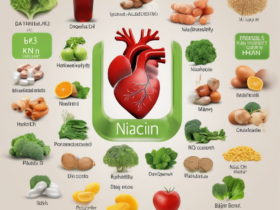Niacin, also known as vitamin B3, is an essential nutrient that plays a vital role in maintaining optimal health and well-being. It is found in a variety of foods, including meat, fish, eggs, nuts, and legumes, and is also available as a dietary supplement.
Niacin is important for many bodily functions, including energy production, hormone production, and the metabolism of fats and carbohydrates. It is also essential for the proper functioning of the nervous system, digestive system, and skin. Niacin helps to reduce inflammation, lower cholesterol levels, and improve circulation.
Niacin is also important for mental health. It helps to reduce stress and anxiety, improve mood, and enhance cognitive function. It can also help to improve sleep quality and reduce the risk of depression.
Niacin deficiency is rare, but can occur in people who have poor diets or who are unable to absorb the nutrient from food. Symptoms of niacin deficiency include fatigue, depression, skin problems, and digestive issues.
The recommended daily intake of niacin is 14-16 mg for adults. It is important to get enough niacin from food sources, as supplements can cause side effects such as nausea, vomiting, and skin flushing.
In conclusion, niacin is an essential nutrient that plays a vital role in maintaining optimal health and well-being. It is important to get enough niacin from food sources, as supplements can cause side effects. Eating a balanced diet that includes a variety of foods is the best way to ensure that you are getting enough niacin.










